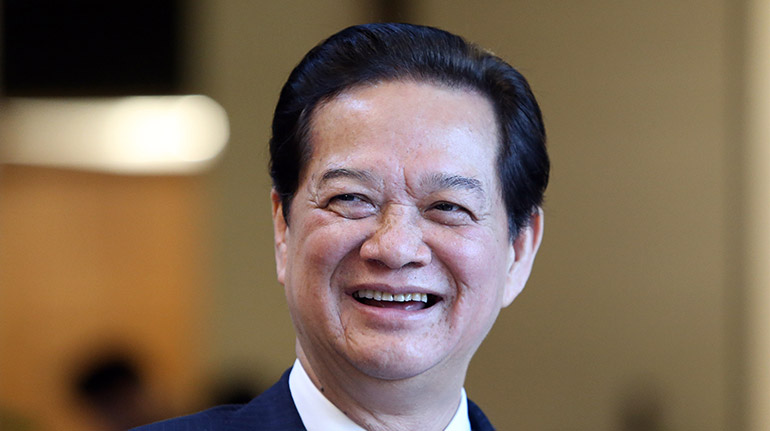The anti-corruption campaigns of Vietnam’s Communist party always feel like inscrutable performance pieces – symposiums on the merits of female modesty held in strip clubs.
They just don’t make sense, given the business model.
Even as the party oversaw decades of massive economic growth, it paid its members paltry salaries. Somehow, though, even the most ‘anti-corrupt’ among them lived well beyond their official means.
Their motorcades and luxury cars shot through cities choked with motorbikes. During one particularly farcical stretch, close readers of the nation’s newspapers learned more from their stolen-property reports than their financial disclosure forms.
At the top of this ladder stood Nguyen Tan Dung, who evolved from a 12-year-old combat nurse scurrying through the mud of the Mekong Delta to the nation’s Teflon two-term prime minister. Parachute journalists and international donors scrounging for a good guy called Dung ‘the reformer’, a man inclined to freedom particularly of markets and navigation.
In reality, his administration presided over an alphabet soup of state banks that gave free money to profligate state-owned enterprises. Every once in a while, bad cadre got caught taking hundreds of millions of dollars in loans no one would ever pay back or selling chunks of the state economy to themselves for a song.

News like this never boded well for Dung.
In 2012, the party slapped the cuffs on one of the richest men in the country – a prominent banker convicted of fraud, tax evasion, illegal trade and “deliberate wrongdoing causing serious consequences”. Many interpreted it as a warning to Dung, who had thwarted an attempt to boot him out of the politburo that very year.
Few took note of the cracks widening in Dung’s patronage network until it finally fractured during the 2016 party congress. It seems the steering committee’s wily general secretary had rewritten the rules of the game to force Dung into retirement. A plurality of the politburo had grown sufficiently grossed-out or jealous of his excesses – perhaps both.
The big man went quietly, and his sons continue to hold party positions in booming beach provinces. His daughter and her billionaire husband continue to do well in Ho Chi Minh City. His allies, though, suddenly found themselves at the mercy of Secretary General Nguyen Phu Trong.
The septuagenarian silver fox dealt disgrace and demotion to some. Others he fed to the Supreme People’s Procuracy – a process that often begins with articles in the pages of the nation’s dying newspapers.
Enter Trinh Xuan Thanh: a balding, acne-scarred official driving around one of the poorest Delta provinces in a Lexus SUV. Not long after Dung’s exit, reporters wanted to know where he got his sweet ride and how his UK-educated 24-year-old son had come to head the marketing department of a state-owned distillery.
Such questions are like thunder to people such as Thanh, who sent the party a doctor’s note and bugged out to Berlin. By the time lightning struck, seven of his former colleagues at PetroVietnam Construction had gotten snared in the search for about $150m that had apparently vanished from the company’s books.
Once in Germany, the 51-year-old Thanh applied for asylum.
My client is like a piece in this puzzle for the general secretary. I think it’s so important to have him there in a schauprozess [show trial], like in Stalin’s time”
While waiting for the wheels of justice to turn, he took the unusual step of granting four interviews to a Vietnamese blogger living in Germany. The transcripts circulated on social media, openly questioning the purpose of crushing loyal ‘screws’ like Thanh: “It is easy to see that many state-owned enterprises suffer losses and, of course, the officials responsible for these enterprises should be held liable; also, it’s apparent that a majority of officials, both political and economic, are corrupt. But in my opinion, the main problem doesn’t lie in these officials, but the system. I used to be a ‘screw’ in this system, so if during my time as a leader PetroVietnam Construction suffered losses, I had to take responsibility. But the fact is, during that time, I was not a greedy person, and I definitely did not commit a crime. Certainly not a ‘deliberate violation of state regulations,’ as Mr. Trong claims. This pursuit was initiated by Mr. Trong purely to consolidate his power.”
One bright day in July, the truth-teller vanished during a walk through Berlin’s Tiergarten Park and re-emerged on Vietnamese television looking like he’d had a rough week. Monotone state broadcasters reported that he’d come home to assuage his guilt and face sweet party justice.
“To believe anyone outside Vietnam could believe that is just unbelievable,” said Thanh’s Berlin-based lawyer, Petra Schlagenhauf. “This is really like George Orwell reloaded.”
German police have since tracked down a Vietnamese construction worker who supposedly drove from Prague to Berlin to help a team of spooks drag Thanh to his embassy and stuff him into an ambulance.
No one’s sure where that ambulance went, but one possibility is Moscow, where Secretary Trong literally earned his PhD in party building. Vietnam’s diplomats have said only that they “regret” Germany’s kidnapping allegations.
“The general secretary hates my client deeply,” Schlagenhauf said over the phone. “The attack isn’t mainly against [Thanh] but others higher than him. I think there will be more persecutions to come. My client is like a piece in this puzzle for the general secretary. I think it’s so important to have him there in a schauprozess [show trial], like in Stalin’s time.”
Calvin Godfrey has worked as a writer and editor in Ho Chi Minh City for seven years. This April, he won the MFK Fisher Distinguished Writing Award for his investigation of the country’s dog meat supply chain.


